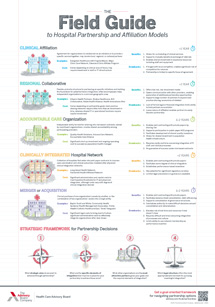Auto logout in seconds.
Continue LogoutBoth the Cleveland Clinic and Mayo Clinic have more than 20 hospital affiliates. Steve Sternberg writes for U.S. News & World Report about how both organizations approach their partnerships—and what's in it for their partners, too.
Affiliates gain access to the larger systems' expertise in improving care quality and the patient experience. They also are able to use Mayo Clinic or Cleveland Clinic's names in their marketing efforts. And both parties benefit from new opportunities for clinical research. But affiliation is competitive, and applicants are carefully screened, Sternberg notes.
By affiliating, "the big brands extend their geographic reach and presence," explains Stuart Seides, physician executive director of Washington, D.C.-based MedStar Heart & Vascular Institute, which has a "clinical and research alliance" with the Cleveland Clinic. "Smaller hospitals bask in reflected glory."
Cleveland Clinic's model
The Cleveland Clinic charges hospital affiliates for an initial six-month screening, in addition to an annual fee for expertise in cardiac care. The system currently has 21 partners, including New York-based North Shore University Hospital and Texas-based Baylor Scott & White Health.
From the Cardiovascular Roundtable
The tools you need to partner better with specialistsAccording to Joseph Cacchione, chair of strategic operations for the Cleveland Clinic's Heart and Vascular Institute, the affiliates' surgeons are held to high standards—the same standards used to evaluate surgeons at the Clinic's own hospitals.
And while the affiliates are locally managed, Cacchione says they are "centrally accountable" for the quality of their cardiovascular care. The system's quality experts review all of affiliates' imaging studies and patient deaths, and track data on appropriateness of care, time in the OR, infection rates, and other key metrics.
Seides says that MedStar Heart & Vascular Institute submits 156 data points related to heart and vascular care every quarter. The Cleveland Clinic then looks for any lapses, and puts safeguards in place to help prevent any issues from occurring again.
11 strategies for enhancing CV specialist partnerships
In addition, the highest-performing system affiliates are "assured a stream of patients" as a result of the Cleveland Clinic's partnerships with several large self-insured companies—including Boeing, Lowe's, and Walmart—that are seeking high-value cardiovascular care for their workers. And Cleveland Clinic physicians are sending more patients who may have previously gone to the system's hospitals to affiliates that are closer to home.
Mayo Clinic's model
Meanwhile, Mayo Clinic charges hospital affiliates a subscription fee for the system's expertise across all specialties. The system currently has more than 30 U.S. hospital partners, including New Hampshire-based Dartmouth-Hitchcock Medical Center and Illinois-based Northshore University HealthSystem.
Mayo provides affiliates with expertise in several different ways, including via:
- AskMayoExpert, a Web-based system that allows physicians to obtain treatment guidelines and clinical data on hundreds of medical conditions; and
- eConsults and eTumor Boards, which allows local physicians to consult with Mayo specialists.
Jeffrey DiLisi, CMO at Mayo affiliate Virginia Hospital Center (VHC), says his hospital has "great doctors on our medical staff, and they do great things, but we don't have anyone on staff who treats only heart tumors." He adds, "Now our VHC patients have access to specialists with that kind of expertise."
In addition, Mayo officials visit affiliates and analyze all performance measures annually, including on care quality, complications, readmissions, and patient deaths. If there is an issue, DiLisi says, Mayo officials help to address it (Sternberg, U.S. News & World Report, 10/5).
The field guide to partnership and affiliation models
Behind the flurry of M&A in recent years, a deeper trend of hospital integration is underway: the emergence of alternative partnerships that secure many of the same benefits of M&A without the financial and legal commitment:
- Clinical affiliation
- Regional collaborative
- Accountable care organization
- Clinically integrated network
This guide defines these types of partnerships and offers benefits, drawbacks, and examples of organizations in each.
Want our strategic framework for partnership decisions? Health Care Advisory Board members can read or download The Strategic Thinker's Guide to Partnerships and Affiliations.
Don't miss out on the latest Advisory Board insights
Create your free account to access 1 resource, including the latest research and webinars.
Want access without creating an account?
You have 1 free members-only resource remaining this month.
1 free members-only resources remaining
1 free members-only resources remaining
You've reached your limit of free insights
Become a member to access all of Advisory Board's resources, events, and experts
Never miss out on the latest innovative health care content tailored to you.
Benefits include:
You've reached your limit of free insights
Become a member to access all of Advisory Board's resources, events, and experts
Never miss out on the latest innovative health care content tailored to you.
Benefits include:
This content is available through your Curated Research partnership with Advisory Board. Click on ‘view this resource’ to read the full piece
Email ask@advisory.com to learn more
Click on ‘Become a Member’ to learn about the benefits of a Full-Access partnership with Advisory Board
Never miss out on the latest innovative health care content tailored to you.
Benefits Include:
This is for members only. Learn more.
Click on ‘Become a Member’ to learn about the benefits of a Full-Access partnership with Advisory Board
Never miss out on the latest innovative health care content tailored to you.

